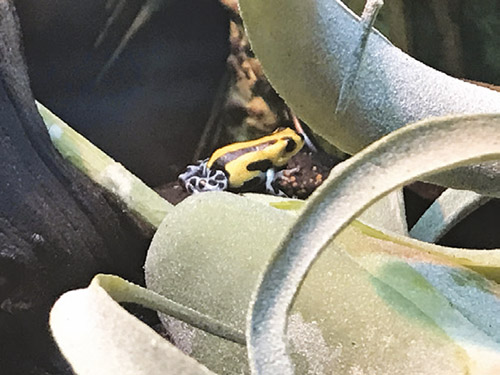
We are excited to welcome a new summer feature, Jew at the Zoo, in which Jewish Link intern Noah will highlight a different animal each week and share some of its more interesting attributes with our readers. We hope you will enjoy it!
Since this is my first article, I want to start things off properly and write about something amazing, something that will blow the minds of the readers (you) and help people become interested in my future articles. However, more importantly, I want to spark an interest in the many animals that Hashem created, a topic that I’m surprised I don’t see or hear people talk about often. Fortunately, I recently had the privilege to go to the Staten Island Zoo with my family, so what better place to begin than there?
I decided that the first animal I would write about would be one that most people would be unfamiliar with and I imagine that the articles that follow will be similar in this regard. In this case, I selected the humble Sira poison dart frog (Ranitomeya Sirensis), a yellow, blue and black amphibian small enough to sit comfortably on my thumb, to be the subject of this article.
According to the sign in front of the enclosure, the males of these rainforest-dwelling frogs carry their tadpoles to pools of water that form in the leaves of a bromeliad, a tree-dwelling plant that resembles a pineapple, providing them with protection until they can care for themselves.
I thought about what it might be like for such a tiny frog to go from tree to tree, searching for a suitable bromeliad that’s wet enough for an even smaller tadpole to grow up in. The frog may be poisonous, which may be a good defense against predators, but such a task is still far from easy. The plants in trees grow high off of the ground so that they are able to properly reach sunlight, meaning that the journey could take a great deal of time and energy. At the same time, if the frog takes too long, the tadpoles could dry out, so it can’t stop too often. If the bromeliad lacks the correct amount of water, the frog has to find a new one.
Perhaps the reason why Hashem decided to plague Egypt with frogs so long ago is to teach us to have such determination. Much like the poison frog, we were in the middle of a great deal of dangerous hardships ourselves and even now our lives are rarely always perfect. Nevertheless, it is important to persevere through difficulty because when something is worth having, it is usually something that one must work for.
Noah Motechin is a summer intern at the Jewish Link.and an English major at Rutgers University. He has an affinity for Torah, writing, and the natural world.











